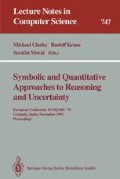Abstract
This paper addresses the problem of automated deduction for Humberstone's inaccessible worlds logic. We exhibit a sound and complete translation into a normal bimodal logic for which efficient proof methods have been devised in the last years. By the way, our translation provides a sound, complete and finitary axiomatization of Humberstone's inaccessible worlds logic.
This work has been partially supported by the Esprit projects DRUMS II and MEDLAR II. Thanks to Philippe Balbiani, Luis Fariñas del Cerro, and Stephan Merz for their comments.
Preview
Unable to display preview. Download preview PDF.
References
L. Catach, “Normal multimodal logics”. Proc. Nat. Conf. on AI (AAAI 88), pp. 491–495, 1988.
Luis Fariñas del Cerro, Andreas Herzig, “Automated Deduction for Epistemic and Temporal Logics”. Handbook of Logic in AI (eds D. Gabbay, A. Galton, C. Hogger), Oxford University Press, to appear.
Olivier Gasquet, “Deduction for Multimodal Logics”. International Conference on Applied Logic (Logic at Work'93), Amsterdam, Holland, 1993.
Valentin Goranko, “Modal Definability in Enriched Languages”. Notre Dame Journal of Formal Logic, vol. 31, 81–105, 1990.
Valentin Goranko, Solomon Passy, “Using the Universal Modality: Profits and Questions”. Report, Sofia University, July 1989.
G. Hughes, M. J. Cresswell, “A companion to modal logic”. Methuen & Co. Ltd, 1984.
I. Humberstone, “Inaccessible worlds”. Notre Dame Journal of Formal Logic, vol. 24, 346–352, 1983.
H. Levesque, “All I know: A study in autoepistemic logic”. J. of AI, 42: 263–309, 1990.
Andreas Nonnengart, “First-Order Modal Logic Theorem Proving and Functional Simulation”, International Joint Conference on Artificial Intelligence, Chambéry, France, 1993.
Hans Jürgen Ohlbach, “Semantics-Based Translation Method for Modal Logics”. J. of Logic and Computation, Vol. 1, 5, pp. 691–746, 1991.
Hans Jürgen Ohlbach, “Optimized Translation of Multi-Modal Logic into Predicate Logic”. Proc. of Logic Programming and Automated Reasoning (LPAR), (ed. A. Voronkov), Springer Verlag, LNAI, 1993.
Author information
Authors and Affiliations
Editor information
Rights and permissions
Copyright information
© 1993 Springer-Verlag Berlin Heidelberg
About this paper
Cite this paper
Gasquet, O., Herzig, A. (1993). Translating inaccessible worlds logic into bimodal logic. In: Clarke, M., Kruse, R., Moral, S. (eds) Symbolic and Quantitative Approaches to Reasoning and Uncertainty. ECSQARU 1993. Lecture Notes in Computer Science, vol 747. Springer, Berlin, Heidelberg. https://doi.org/10.1007/BFb0028194
Download citation
DOI: https://doi.org/10.1007/BFb0028194
Published:
Publisher Name: Springer, Berlin, Heidelberg
Print ISBN: 978-3-540-57395-1
Online ISBN: 978-3-540-48130-0
eBook Packages: Springer Book Archive

